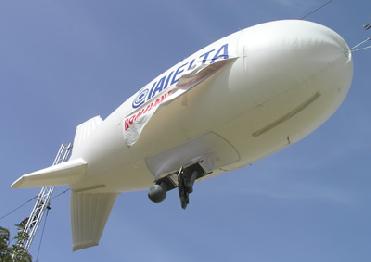
A file photo of Aerostat radar system
NEW DELHI (PTI): Faced with intelligence inputs of a possible terror threat from the skies on the pattern of 9/11, the Indian Air Force (IAF) has decided to install highly-sophisticated radar in Delhi to detect “rogue” low-flying aircraft.
"We are planning to deploy dedicated Aerostat radar here to secure the capital from threats from low-flying aircraft," IAF sources said here on Tuesday.
The decision to install the radar in Delhi comes close on the heels of Defence Minister A K Antony saying that the country needs to guard against aerial threats.
The radars would be integrated with units of surface-to-air missiles (SAM) based in the capital. After the recent terror strikes in Mumbai, intelligence agencies had warned about a World Trade Centre-type terror strikes at important locations across the country.
Recently, Antony chaired a high-level meeting of the tri-service chiefs and his Ministry officials to discuss means to counter any such aerial threat, after terrorists breached coastal security in Mumbai.
In response to the intelligence warnings, IAF chief Air Chief Marshal Fali Homi Major had recently said, "We are prepared to tackle any such threat."
The deployment of an Aerostat here is one of the steps taken by the IAF to strengthen the aerial security of the capital, the sources said.
The IAF has been planning to deploy an Aerostat in the capital for some time now after some aircraft breached the no-fly zone areas here.
India had earlier acquired Aerostat radars from Israel. It has major parts like the aerostat balloon and the payload on board the balloon which consists, advanced programmable radar (APR), Electronic Intelligence (ELINT), Communication Intelligence (COMINT) and V/UHF radio telephony equipment and Identification Friend or Foe (IFF).
It has the capability to be integrated with AWACS and ground air defence environment and function as a command and control centre. Depending upon the payload, the tethered balloon can be raised to the height between 10000 feet to 16000 feet. The system gives a seamless radar cover of 300 km plus at low level along with good RT range and requisite ELINT. The system could be termed as static AWACS.
 Next Article
Next Article













The Indian Air Force, in its flight trials evaluation report submitted before the Defence Ministry l..
view articleAn insight into the Medium Multi-Role Combat Aircraft competition...
view articleSky enthusiasts can now spot the International Space Station (ISS) commanded by Indian-American astr..
view article